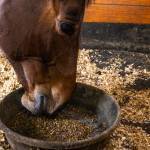Question
I have heard that a natural remedy for hypothyroidism in a horse is to give iodine instead of treating with a synthetic thyroid hormone. Does iodine work the same as thyroid hormone? Is it safe to give a broodmare supplemental iodine? Can a kelp or seaweed supplement work as an iodine supplement?
Answer
Thyroid hormone produced by the thyroid gland is responsible for a number of functions in the body, the main one being regulation of basal metabolism. If a horse is thought to be “hypothyroid,” it means the metabolism is sluggish due to low thyroid hormone production. Even though true hypothyroidism is uncommon in horses, it is routinely given as a reason for obesity and lack of energy.
Thyroid hormone replacement therapy is frequently used in horses to treat hypothyroidism as well as obesity, equine metabolic syndrome, reproductive problems, anhidrosis, and other problems with metabolism. An important component of thyroid hormone is iodine, and it is necessary for the synthesis of both thyroxine (T4) and triiodothyronine (T3), the two forms of thyroid hormone. The idea behind iodine supplementation is to boost thyroid hormone manufacture in the thyroid gland by providing more substrate.
In rare cases in which iodine deficiency results in hypothyroidism, supplementation of iodine might be warranted. Unfortunately, if there is no iodine deficiency, little difference in thyroid hormone production will be seen with iodine supplementation. Iodine excess is much more common than deficiency. Interestingly, the signs of iodine deficiency are the same as those of iodine excess, and hypothyroidism may result from either underconsumption or overconsumption of iodine. The most notable outward sign of a problem is goiter, an enlarged thyroid gland. Other signs are lack of energy, abnormal estrous cycles, abortion, alopecia, and an increased susceptibility to infectious diseases.
Broodmares should not receive excessive amounts of iodine since it can cause problems with the foals. The fetus is solely dependent on maternal intake for its iodine supply and is more sensitive to the effects of overconsumption, so a foal can be born with goiter even though the mare showed no signs. Toxicity has been seen in foals born to mares consuming 40 mg/d. Overconsumption can affect viability of the foal, and those foals that survive to delivery may exhibit other signs of iodine toxicity like weakness, difficulty standing to nurse, and extreme flexural deformities of the lower forelegs.
Kelp or seaweed supplements contain high levels of iodine but when used correctly do not result in toxicity. If using a kelp or seaweed supplement with pregnant mares, it is particularly advisable not to exceed the recommended dosage on the product. These supplements cannot cure hypothyroidism if iodine deficiency is not the cause.








